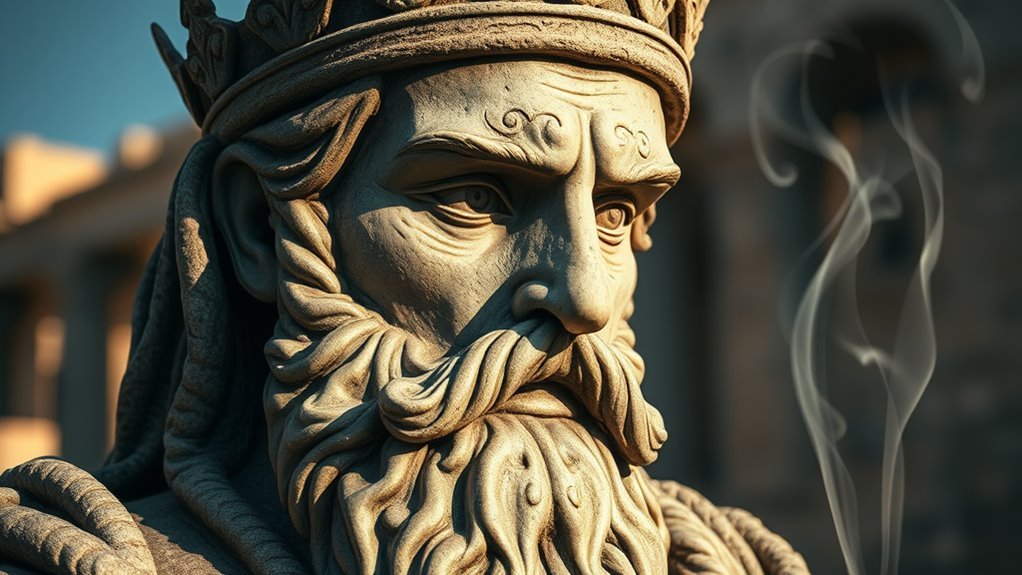13 Spiritual Meanings of Herod
As we explore the 13 spiritual meanings of Herod, we can't help but notice how his story mirrors our own struggles with power, ambition, and moral choices. Herod's reign serves as a stark reminder of the consequences that fear-driven leadership can provoke. By examining his legacy, we might uncover essential lessons about humility and ethical responsibility. Yet, there's more beneath the surface—questions about spiritual blindness and the quest for redemption. What might these insights reveal about our own lives and decisions? Let's take a closer look at the complexities involved.
The Nature of Power
Power, in its myriad forms, reveals the complexities of human ambition and the often tumultuous path it carves through history. As we explore the nature of power, we must examine the intricate power dynamics that govern relationships within societies. Authority isn't simply about dominance; it's also about the ethical responsibilities that come with wielding influence.
We find ourselves reflecting on how authority ethics shape our understanding of leadership. When leaders fail to adhere to ethical standards, they unravel the fabric of trust that binds communities. This erosion often leads to societal discontent and upheaval, reminding us that power can be both a tool for progress and a weapon of destruction.
In considering Herod's reign, we see a poignant illustration of the precarious balance between authority and ethics. His pursuit of power highlights how ambition can distort moral judgement, leading to actions that harm the very people one is meant to protect.
As we navigate our own lives, let's remain mindful of these lessons, recognizing that the true measure of power lies not just in its acquisition, but in its ethical application for the greater good.
Fear and Control
Fear often serves as a potent tool for control, shaping the actions and responses of both leaders and the governed. In examining the legacy of Herod, we see that fearful leadership often relies on control tactics that exploit insecurity. Leaders like Herod harness fear to maintain their power, creating an atmosphere where dissent is stifled and compliance is coerced.
This dynamic not only affects their immediate circle but also reverberates through society, instilling a pervasive sense of anxiety among the populace.
As we reflect on these themes, we recognize that fear can create a false sense of security for those in power. However, this control is inherently fragile; it relies on the constant suppression of dissent and the manipulation of public perception.
When we allow ourselves to become entrapped in such systems, we risk our own agency and collective well-being.
Understanding the spiritual implications of fear and control invites us to seek deeper connections and healthier forms of leadership. We must endeavor to cultivate environments where trust prevails over fear, empowering individuals to rise above oppressive dynamics and reclaim their voices within the community.
Ambition and Its Pitfalls
Ambition, when left unchecked, can lead to a series of detrimental consequences that echo through history, as exemplified by Herod's reign. We see how his ambitious pursuits, driven by a relentless desire for power, ultimately became his downfall. His quest for dominance transformed him into a figure defined by paranoia and cruelty, eroding not only his humanity but also the well-being of those around him.
As we analyze the power dynamics at play during Herod's rule, we recognize that ambition can warp our values. Instead of fostering unity and collaboration, it can breed mistrust and betrayal. Herod's desperate attempts to secure his position led to ruthless actions, including the execution of perceived threats, revealing the dark side of ambition.
In our own lives, we must remain vigilant. While ambition can motivate us to achieve great things, it requires a delicate balance. We need to ask ourselves: Are we pursuing our goals in a way that uplifts others, or are we allowing ambition to cloud our judgment?
Moral Ambiguity
Maneuvering the complex landscape of moral ambiguity, we find ourselves confronted with the uncomfortable reality that our ethical choices often exist in shades of gray rather than in clear-cut black and white.
The figure of Herod exemplifies this moral complexity, as his decisions reveal a tapestry of ethical dilemmas that challenge our understanding of right and wrong.
- Natural soy 6 oz candle for Negative Energy & People
- Includes Sage, Himalayan Crystal Salt and Essential Oils in Every Candle
- 7 Chakra Crystal Candles Set: Each candle includes chakra tumble stones giving you the most healing...
- Variety of Unique Aromas: Choose from 7 different aromatherapy scents and a wonderful selection that...
- Cleansing Sage: Elevate your home with the soothing essence of sage candles. Ideal for relaxation...
- Pure, Non-Toxic Bliss: Crafted from soy wax, these candles emit no harmful toxins. Enjoy a clean,...
- Self Love Crystal CANDLE - Enjoy the fresh, floral Sea Salt & Orchid scent during intentional...
- Homegrown and Organic Herbs - Embrace self-love and personal acceptance with the Girls Need Love...
- Natural Sea Salt for Purification: Crafted from pure sea salt, it’s used for energy purification,...
- Ideal for Rituals & Spellwork: Use this natural sea salt in rituals like spellwork, altar...
As we reflect on Herod's actions, we see a ruler torn between personal ambition and the expectations of his society.
This duality invites us to contemplate our own lives, where we frequently encounter similar conflicts.
Are we, too, maneuvering situations where the right choice isn't immediately apparent?
In grappling with these dilemmas, we realize that moral ambiguity often forces us to weigh our values against competing interests, igniting the potential for both growth and turmoil.
The Fear of Loss
In the shadow of power and privilege, we often find ourselves grappling with the fear of loss that shapes our decisions and relationships. This fear can manifest as fearful attachments, binding us to people and possessions we might otherwise let go. We cling to these attachments, believing that losing them equates to personal failure or a diminished sense of self.
This loss aversion drives us to make choices that prioritize security over authenticity, often leading us down paths of moral ambiguity. As we navigate our lives, we must recognize how this fear influences our actions. The stories of figures like Herod illustrate how the desire to maintain control can lead to destructive behaviors, revealing the darker aspects of our humanity.
When we allow fear to dictate our choices, we risk perpetuating cycles of anxiety and isolation. Understanding our fear of loss invites us to confront it, encouraging a healthier relationship with what we hold dear. By reframing our perspective, we can move beyond fearful attachments and cultivate a sense of belonging that isn't rooted in possession or power, but in genuine connection and acceptance.
Consequences of Pride
Pride often serves as a double-edged sword, granting us a sense of identity while simultaneously risking our moral compass. When we engage in prideful actions, we may find ourselves buoyed by confidence, but this can quickly shift into arrogance, distancing us from our true selves and from one another.
As we look at the story of Herod, we see how pride led to destructive consequences; it transformed his leadership into tyranny, ultimately isolating him and leading to his downfall.
In our own lives, we must remain vigilant against the allure of pride. It can cloud our judgment, making us believe we're above reproach, while simultaneously eroding the values that bind us together.
When we allow pride to dictate our decisions, we risk alienating those around us, fostering an environment where empathy and understanding are overshadowed.
Let's recognize that our pride can be a barrier to genuine connection. Instead of allowing it to dictate our actions, we should endeavor for humility, embracing vulnerability and openness.
The Struggle for Identity
Many of us grapple with the complexities of identity throughout our lives, often influenced by external expectations and internal struggles. This journey can lead us to confront an identity crisis—a moment of profound self-doubt that demands we reassess who we're and what we stand for.
As we commence on our quest for self-discovery, we may encounter pivotal moments that shape our understanding of ourselves:
- The influence of family and societal norms, which often dictate our self-perception.
- The power of personal experiences and choices that challenge our beliefs and values.
- The search for belonging and acceptance, which can either affirm or fracture our sense of identity.
In traversing these experiences, we come to realize that our struggles aren't isolated. They resonate deeply within our shared human experience, connecting us through collective challenges.
As we reflect on our own identity, we might find that embracing vulnerability can lead to authentic connections, fostering a sense of belonging.
Ultimately, confronting our identity crisis becomes not just a personal journey, but a universal pursuit, guiding us toward a clearer understanding of who we're in a complex world.
The Impact of Choices
While traversing the complexities of identity, we often find that the choices we make play a pivotal role in shaping who we become. Our decisions aren't isolated; they reverberate through our lives, influencing our paths and altering our perceptions of self.
In examining the life of Herod, we uncover the weight of choice consequences and the ethical dilemmas he faced. Each choice, whether for power, security, or legacy, presents a fork in the road, compelling us to confront our values and beliefs.
As we reflect on Herod's actions, we recognize that our choices shape not just our destinies but also our communities. They create ripples that can foster connection or division.
Ethical dilemmas often arise when our desires conflict with moral imperatives, prompting us to evaluate what truly matters. In maneuvering through these dilemmas, we can either strengthen our sense of belonging or succumb to isolation.
Ultimately, we must acknowledge that the choices we make resonate beyond ourselves. They weave into the fabric of our shared human experience, guiding us toward deeper understanding and connection.
In embracing this awareness, we empower ourselves to choose with intention and compassion.
Legacy of Violence
The legacy of violence stemming from Herod's reign offers a profound insight into the darker aspects of power and authority. Herod's tyranny created a violent legacy that continues to resonate within our cultural and historical consciousness.
We can illustrate this legacy through three key aspects:
- Political Maneuvering: Herod's brutal strategies reinforced his grip on power, often sacrificing loyalty for dominance.
- Family Betrayal: His willingness to eliminate perceived threats, even among family members, reflects a chilling moral corruption.
- Societal Fear: The pervasive climate of fear stunted community cohesion, leading to a culture that valued survival over integrity.
In this historical context, we witness the psychological impact of Herod's reign, where societal fear bred a culture of silence and complicity.
The religious significance of his actions can't be overlooked, as they influenced the perception of authority in a faith deeply rooted in moral values.
By examining these cultural implications, we recognize that Herod's legacy serves as a cautionary tale about the dangers of unchecked power.
Let's reflect on how this violent legacy shapes our understanding of authority and the moral dilemmas that persist in our own societies.
Spiritual Blindness
Spiritual blindness manifests as a profound disconnect between one's actions and the moral truths that underpin them. We often find ourselves traversing a world where our choices reflect a lack of awareness, obscured by the distractions of daily life. This disconnect can lead us to pursue goals that align with worldly desires rather than our higher moral calling.
When we examine figures like Herod, we recognize how spiritual blindness can corrupt not only the individual but also entire communities. This lack of spiritual vision prevents us from experiencing the inner awakening necessary for genuine connection with ourselves and others. We might cling to power, status, or fear, all while neglecting the deeper truths that guide our spiritual journeys.
To overcome spiritual blindness, we must cultivate awareness and seek clarity in our intentions. By embracing reflective practices, we can align our actions with our higher values, fostering a sense of belonging among like-minded souls.
Let's encourage each other to turn inward, illuminating the path toward a shared understanding of compassion, justice, and love. In doing so, we can collectively awaken to a more profound spiritual vision that transcends the limitations of our current perspectives.
Redemption and Forgiveness
Redemption and forgiveness serve as pivotal themes in understanding the complexities of the human experience, particularly when exploring figures like Herod. While Herod's actions evoke feelings of horror and condemnation, they also challenge us to reflect on our own shortcomings and the transformative power of redemptive love.
As we explore this subject, we can visualize three essential aspects of the forgiveness journey:
- Acknowledgment of Fault: Recognizing our own failings allows us to embrace vulnerability and humility.
- Sincere Repentance: This step involves genuine remorse for our actions, paving the way for healing and restoration.
- Embracing Grace: Accepting the gift of forgiveness—not only from others but also from ourselves—opens the door to new beginnings.
In traversing these themes, we find that redemption isn't merely a passive gift; it requires active participation.
Herod's narrative compels us to confront our own moral dilemmas, prompting us to seek reconciliation and understanding in our lives.
Ultimately, this journey enriches our relationships and fosters a sense of belonging as we collectively pursue a path toward healing and renewal.
The Role of Prophecy
Throughout history, prophecy has played a significant role in shaping our understanding of divine purpose and human behavior, particularly in the context of figures like Herod. We see how prophetic fulfillment often serves as a lens through which we interpret events and decisions, revealing deeper spiritual truths.
In Herod's narrative, we encounter a complex interplay of fear, ambition, and divine intervention, showcasing how prophecy can lead to both hope and despair. Herod's actions—his ruthless pursuit of power—reflect not only his personal ambitions but also an attempt to thwart the prophetic messages surrounding the birth of a new king.
This conflict illuminates the tension between human agency and divine will, prompting us to reflect on how we respond to prophetic insights in our own lives. Through Herod, we witness the consequences of ignoring prophecies that call for humility and justice.
His story serves as a cautionary tale, reminding us of the importance of embracing divine guidance rather than resisting it. As we reflect on these themes, we recognize that prophecy invites us into a deeper relationship with the divine, urging us to align our actions with a greater purpose.
The Search for Meaning
In our quest for understanding, we often grapple with the deeper meanings behind historical figures like Herod, whose life exemplifies the complexities of ambition and moral failure.
As we engage in spiritual inquiry, we can't help but confront existential questions that resonate within us all, pushing us toward a deeper exploration of our own lives.
Herod's story invites us to reflect on:
- Ambition vs. Ethics: How far will we go to achieve our goals?
- Power and Isolation: Does the pursuit of power lead to loneliness?
- Legacy and Regret: What do we want to be remembered for?
These themes compel us to examine our motivations and the repercussions of our choices.
As we analyze Herod's actions, we recognize that his path is a cautionary tale—a mirror reflecting our struggles with integrity in a competitive world.
In this search for meaning, we find community among those who wrestle with similar dilemmas.
By engaging with Herod's life, we uncover not just his failures but also the universal truths that bind us together in our shared human experience.
Let's continue this dialogue, exploring how we can learn from the past to enrich our present.
Frequently Asked Questions
What Lessons Can Modern Leaders Learn From Herod's Story?
We can learn from Herod's story how power dynamics often lead to moral dilemmas. By examining his choices, we recognize the importance of integrity and empathy in leadership, fostering a more inclusive and ethical approach to governance.
How Does Herod's Legacy Influence Contemporary Spiritual Beliefs?
Herod's influence shapes contemporary spiritual interpretations, prompting us to reflect on power's moral implications. By examining his legacy, we grasp the complexities of leadership, fostering a deeper understanding of our own spiritual journeys and community values.
What Role Does Forgiveness Play in Herod's Narrative?
In Herod's narrative, the dynamics of forgiveness reveal complex layers. We see missed redemption opportunities, emphasizing how understanding forgiveness can reshape our perspectives, allowing us to explore our own paths toward healing and acceptance together.
Can Herod's Actions Be Seen as a Metaphor for Personal Struggles?
Herod's actions highlight our personal conflicts and moral dilemmas. They reflect the struggles we all face when power and fear overshadow our better judgment, reminding us of the complexities inherent in our own lives.
How Does Herod's Life Reflect the Human Condition Today?
Herod's life mirrors our own human condition by exposing human frailty and the complexities of power dynamics. We're reminded that ambition can lead to moral compromise, reflecting struggles we all grapple with in our lives today.

Sofia Phillips is a renowned spirituality expert and the visionary behind SoulfulCreature.com. With a compassionate heart and an enlightened mind, Sofia embarks on a quest to guide others through the realms of spirituality. Her approach is deeply rooted in providing a nurturing and positive experience, allowing individuals to explore and grow in their spiritual journey.






